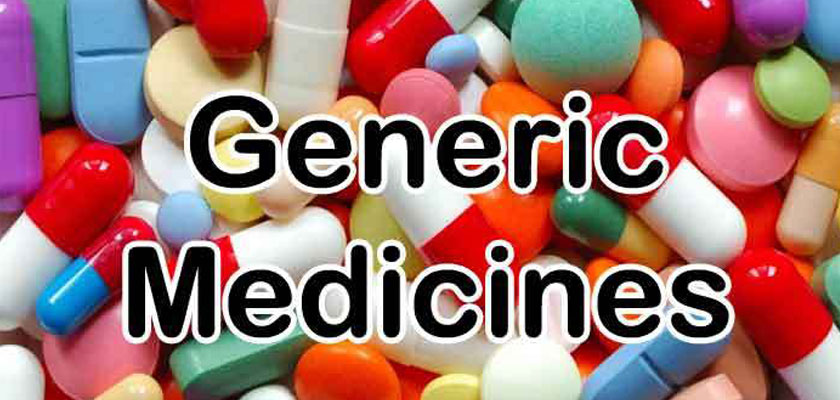WHAT IS GENERIC MEDICINE
let's consider the brand-name drug "Dolo 650”." It is initially developed by a pharmaceutical company and has a specific name, appearance, and packaging. After the patent for Dolo 650 expires, other companies can create generic versions. A generic version of Dolo 650 will have the same active ingredient and work in the same way as the original drug. However, it might have a different name, appearance, and packaging. Despite these differences, the generic version of Dolo 650 is just as safe and effective as the original drug. It provides the same benefits but at a lower cost, making it a more budget-friendly option for patients.
In a groundbreaking move, the National Medical Council has announced a transformative change that is set to shape the healthcare landscape across the nation. According to the new regulations, all doctors will be mandatorily required to prescribe generic drugs to their patients. This policy shift holds the promise of reducing healthcare costs, increasing accessibility to essential medications, and promoting a more equitable healthcare system. However, as with any significant change, there are both advantages and potential challenges associated with this mandate for both doctors and patients.
Pros for Doctors:
- Ethical and Professional Integrity: The prescription of generic drugs aligns with doctors' commitment to the ethical principle of prioritizing patients' well-being over financial gains. It reinforces the trust patients have in their physicians and fosters a strong doctor-patient relationship.
- Cost-Efficiency: Generic drugs are typically more affordable than their brand-name counterparts. By prescribing generics, doctors can help patients save money on their medication costs, potentially leading to improved adherence to treatment plans.
- Reduced Administrative Burden: Generic drugs are often widely available and interchangeable, which can simplify the prescription process. Doctors might find themselves spending less time navigating complex insurance coverage and prior authorization procedures.
Cons for Doctors:
- Educational Requirements: Doctors might need additional education and training to fully understand the nuances of various generic drug options. Keeping up with the constantly evolving field of pharmaceuticals could require ongoing effort.
- Patient Concerns: Some patients may have reservations about the efficacy and safety of generic drugs, leading to increased time spent addressing concerns and ensuring patient compliance.
Pros for Patients:
- Affordability: The primary advantage for patients lies in the reduced financial burden associated with generic drugs. This shift can significantly improve medication adherence, ultimately leading to better health outcomes.
- Increased Access: With lower costs, a broader demographic of patients will have access to essential medications that were previously beyond their reach due to financial constraints.
- Healthcare Equity: Mandatory generic prescription can contribute to a more equitable healthcare system by ensuring that all patients, regardless of their socioeconomic status, have access to the same standard of care.
Cons for Patients:
- Perceived Efficacy: Some patients might still harbor doubts about the efficacy of generic drugs in comparison to brand-name alternatives. Overcoming this skepticism and building trust in the medical community could pose challenges.
- Availability and Quality: In certain cases, there might be concerns about the consistent availability and quality control of generic drugs, which could raise safety issues if not appropriately addressed.
- Personalization: Patients with unique medical needs might find that generic drugs do not cater to their specific requirements as effectively as branded medications. Personalized treatment plans could become more complex due to limited drug options.
Indian medical association raises question
The statement from the Indian Medical Association (IMA) raises the question of why branded drugs should be licensed if doctors are not allowed to prescribe them. Essentially, the IMA is highlighting a concern about the practice of only allowing doctors within a specific medical system to prescribe certain drugs. This implies that modern medicine drugs can only be dispensed when prescribed by doctors within that system. If branded drugs are restricted from being prescribed by these doctors, the IMA questions the purpose of licensing such drugs in the first place. This suggests a potential inconsistency or lack of alignment between the licensing of branded drugs and the prescription practices within the medical system. The statement prompts consideration of the underlying reasons for this situation and the potential implications it might have on patient care and treatment options.
In conclusion, the mandatory prescription of generic drugs by the new National Medical Council is poised to usher in a transformative era in healthcare. While the pros include cost savings, improved access, and healthcare equity, both doctors and patients will need to adapt to the changing landscape. Ensuring that doctors receive the necessary education and patients have confidence in the efficacy and safety of generic drugs will be vital in realizing the full potential of this policy shift. As the medical community navigates these changes, a patient-centered approach combined with ongoing dialogue will be crucial to address concerns and achieve successful implementation.

 The mandatory prescription of generic drugs by the new National Medical Council is poised to usher in a transformative era in healthcare. While the pros include cost savings, improved access, and healthcare equity, both doctors and patients will need to adapt to the changing landscape.
The mandatory prescription of generic drugs by the new National Medical Council is poised to usher in a transformative era in healthcare. While the pros include cost savings, improved access, and healthcare equity, both doctors and patients will need to adapt to the changing landscape.






















.jpeg)









